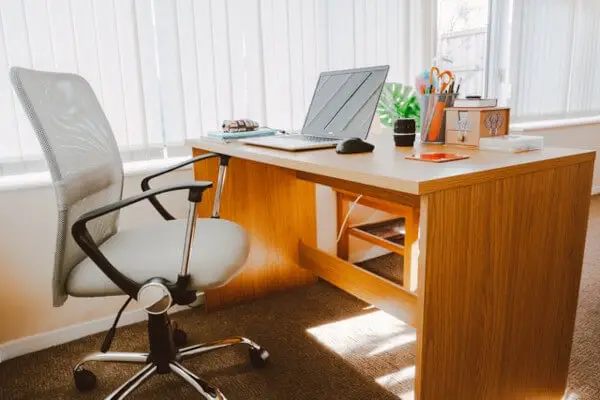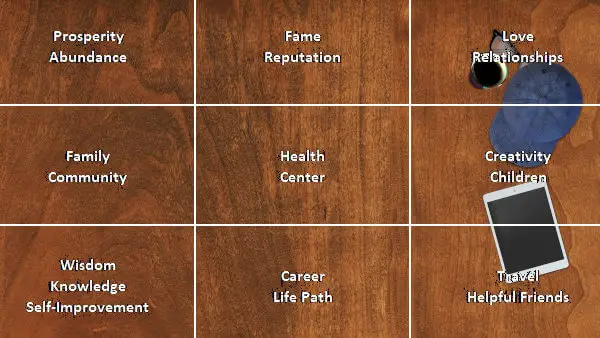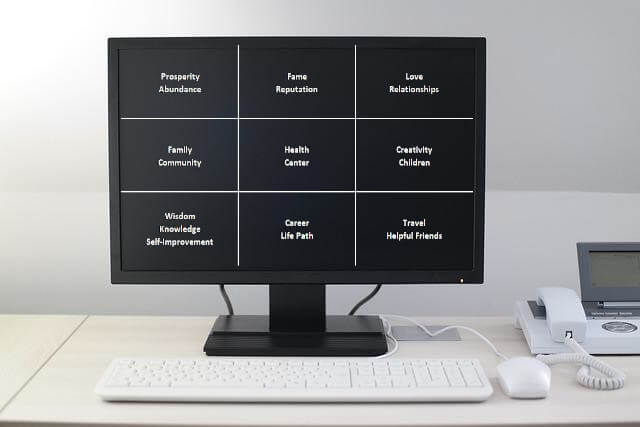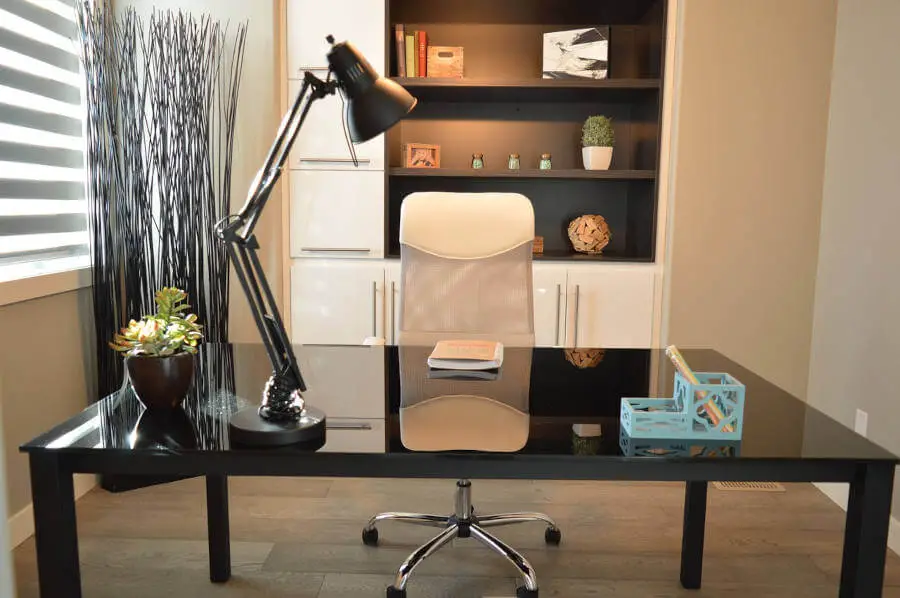Whether at a home office or in a cubicle, many of us spend a significant portion of each day sitting at our desks. The way your workspace is set up can have a big effect on how productive you are. It can either help you stay focused and motivated or give you a lot of distractions and interruptions.
Feng shui at work is a combination of two very important aspects of office design. First, it prioritizes employee comfort. Second, it determines the best way to use available space. Feng shui design incorporates these two elements into a single focal point.
When it comes to the comfort of employees, a healthy and happy worker can lead to a rise in overall productivity, whether they work from home or in a dedicated space. In fact, according to University of Oxford research, happy employees are 13% more productive.
Furthermore, implementing feng shui concepts in your office is one method to establish a tranquil, productive work atmosphere and produce positive energy that spreads throughout your life.
Fortunately, there are several methods to improve the atmosphere of your workplace. In this post, we believe that strong finances in a company are crucial and relieve an individual’s emotional burden, but our primary focus is on physical and mental wellness.
Home Office Feng Shui
Home offices have particular issues since they typically have to fit into areas that are already being utilized for something else. First, ensure that you have a dedicated desk, which signifies a steady career.
Another crucial guideline is that a home office should never be located in the bedroom.
The energy of the activities performed in the workplace and bedroom are contrary. The office has a lot of energy, while the bedroom needs to be relaxing and make you want to sleep. If you don’t have a separate room, the best place for a home office is in a shared space with clear boundaries, like a screen, curtain, or accordion door.
The home office should be located in the bagua’s wind (prosperity) area. Even a small corner can be turned into a nice office space, but make sure to use a comfortable chair that you can adjust and a work surface that is right for the job.

How to Implement Feng Shui at Your Workplace
There are many ways to use feng shui in your office, like using the right colors and putting your furniture in the right place. Here are some suggestions.
Remove All the Clutter
Before you can bring positive energy into your office, you must first clear out all of the clutter. A clean, clutter-free desk allows you to concentrate on the task at hand rather than the chaos around you. Clear your workspace of anything you don’t need, like old papers, extra office supplies, and other random things. Make sure the floor is clear of clutter so that “chi,” or life force energy, may flow freely.
This also applies to the hidden mess. Don’t forget to declutter your drawers and your PC. Just because it isn’t on your desktop doesn’t mean it isn’t significant in molding the vibe of the space.
Toss or repair anything that doesn’t work, and get rid of anything that makes you feel bad.
Desk Positioning
Desk location is very critical in Feng Shui. It needs to look nice and be comfortable for you to want to work and get things done.
The key to a feng shui office arrangement is to place your desk in the command position. You should be able to see the door from your desk without being right in front of it.
Most sources say that this is a position of authority, but it is also possible that by being able to view the door, you are not subconsciously worried about someone entering without your knowledge.
Put a mirror on your desk or next to it if you work in an office where you aren’t able to rearrange your desk. This will allow you to see people entering and leaving behind you.
Furthermore,
- If you have a wall behind you, the light source won’t shine on your computer screen or cast a shadow on your work.
- You shouldn’t sit with a window right behind you because it makes you less safe and can cause drafts.
- It’s usually best to sit where you can see the whole room. You’ll experience a greater sense of control over your environment.
- In order to project a sense of authority, have an image of mountains behind you.
Choose Natural Light
Natural light is always best, so if you can, move your desk near a window, but not so close that it causes glare. Never position your workstation to face a window or a fluorescent light, since this may cause eyestrain and tiredness.
Change out your fluorescent lights for lights with a warmer spectrum. In Feng Shui, light is energy, so where and what kind of lighting you use changes the mood of a room. It also gives energy to the parts of a building or room that correspond to that location in the Bagua.

Improving Air Quality
The quality of the air in the office is critical for increasing productivity. You may open the windows when the weather is nice and you don’t have to use the central heating and A/C. This will make the room feel clean and let positive energy flow into the space.
If your office lacks access to an open window or an outside area, several plants can help filter the air. This not only improves the air but also creates a more pleasant work atmosphere. Plants that are suitable for this task include:
- Pothos plants
- The reed palm
- Moth orchids
- Dwarf date palm
- The snake plant
- The Boston fern
- Eternity palm
- Janet Craig dracaena
- Gerbera daisies
- English ivy
- Bamboo
- Peace Lily
- Money trees
- Rubber plant
Also, putting plants in corners of the office that aren’t being used is a good way to bring energy to those dead spots. A plant in the room’s prosperity corner represents expansion. Keep all plants healthy and growing, otherwise, they will bring a lot of bad chi into the space.
🍀 Our “Feng Shui Master” app is your trusted companion, offering a useful guide to implementing Feng Shui principles. Try it now!
Creating Pleasant Sound Energy
Sounds may have a beneficial or bad impact on the work environment, and it is a highly personal choice.
From a sensory standpoint, pleasant noises may make a location feel more harmonic in nature. According to feng shui, they also aid in the movement of chi throughout the area.
If you can, try to get rid of the following noises at work, as they may be considered noise pollution:
- Noise from shops and businesses
- Traffic noises
- Sounds from household appliances
- Voices coming from a crowded corridor
- Loud, harsh, or annoying music
Although some people may learn to tune out these annoying noises, they are still there and will subtly change the energy in the place. The use of soft tapestries, wall hangings, sound-absorbing walls, and plants can assist in absorbing sound and can help conceal these irritants to some extent. Sound machines and music can also help. If nothing else works, use earplugs.
Contrarily, certain soothing tones can help infuse a room with a more optimistic vibe.
- Natural sounds
- Wind chimes
- Birds singing
- Flowing water
- Music that is uplifting
Feng Shui Diploma Course
- Certified Course
- Accredited Course
COURSE INFORMATION
- 10 Modules
- Lifetime Access
- Study Group Access
Use “LIGHTWARRIORSLEGION466 ” code for 70% off.
Feng Shui Office Decor
An excellent method to get your team’s energy flowing is by incorporating art into the workplace. It is also a method for incorporating feng shui components that may be absent otherwise.
Direction is one method of incorporating artwork into your workplace.
The North wall stands for a successful career. This section can be enhanced with a picture or work of art with the element of water.
The West wall is associated with creativity. Anything with abstract expressionism, cubism, or dadaism in it would look great on this wall.
The East wall is associated with health and vitality. Team pictures and other pictures or photos that show the beauty of life or nature work well in this situation.
Lastly, the South wall is about reputation and fame. This area is considered to either improve or degrade the public image. Activate it by displaying artwork depicting the element of fire in warm hues and abstract designs.
If you want to use the Bagua to map out your workplace, it is helpful to place the following objects in the corresponding areas of the bagua. The main door to your office should be used to position the bagua map. This works for both home and workplace settings.
- In the “knowledge, wisdom” area: Books
- In the “prosperity” area: a crystal bowl.
- In the “helpful friends” area: communication devices or the reception
- In the “family” area: family photos
Make sure your workspace does not have an excessive amount of creative or relaxing items. To encourage work-oriented emotions, take some of them away and replace them with more structured elements. Wood is a sign of growth, development, and planning, so a wood desk is a great option to have in the office.
Related reading: Mastering Feng Shui Maintenance: Your Guide to Harmonious Living – Opens in new tab

How to Get the Five Elements of Feng Shui in Balance
The five elements that attract energy, or “chi” are wood, fire, earth, metal, and water. For the best flow, it’s important that your office has a good balance of all the elements.
- Wood is a symbol of development, creativity, and an uplifting spirit that may help you in your professional life. This aspect is represented by having greenery in the office, such as trees or plants. Where you put them will also impact what you attract more of into your life, whether it’s love, riches, or more positive feelings.
- The most powerful element, fire, generates drive, energy, change, and growth. Candles, triangular forms, and the colors red, pink, orange, and yellow may be used to bring the fire element into the room.
- Water gives peace, fluidity, ease, and refreshment. It is also associated with inspiration and emotion. It is a wealth remedy and a sign of wealth. Water fountains, glass, and mirrors may be used to decorate your office to improve the flow of this element. You can also add blue and black colors and shapes with waves and curves.
- Earth is a symbol of power and stability. Earthy colors like brown and light yellow, as well as ceramic objects, stones, pottery, or tiles, will provide a grounded feeling. The same applies to old books.
- Metal is an important element in feng shui. It is thought to provide concentration, clarity, order, acute thinking, and even productivity by bringing all other aspects together. This element is represented by white, gray, silver, or metal objects.
Feng Shui Office Colors
Colors should enhance the atmosphere you wish to create in the space. Choosing the right colors for your workplace will have a big effect on how you feel and how much work you get done.
Consult the preceding chart of the Five Elements and other colors to ensure that you have a balance of Yin and Yang energy, and select colors that you genuinely enjoy! Colors reflect wavelengths, which are connected to distinct forms of energy.
- White – promotes vitality and abundance, has a relaxing effect, and boosts determination, mental clarity, and keen concentration.
- Red generates positive energy and is associated with passion, fame, good fortune, and happiness.
- Green promotes confidence, encourages company growth, and is tranquil and relaxing.
- Yellow reminds us of the sun and its warmth, which makes us feel hopeful and happy.
- Blue promotes creativity.
- Brown represents life stability and grounding.
- Gray is the color of leadership
- Black stimulates the mind, improves communication, helps focus the mind, and makes it easier to make decisions.
- Creamy colors are relaxing.
- Purple denotes focus.
Take a look at some Feng Shui product ideas – Aff.link
Activate the Wealth Corner
The prosperity and abundance corner is one of the feng shui bagua’s areas. By activating this area, which is quite popular, you may attract more wealth and prosperity to come to you. To discover the wealth corner of your workplace, stand in the doorway facing inside and locate the far left corner on your office’s left side.
In the same way, you can find the wealth corner of your desk. This is especially helpful if you work in a shared or multipurpose room. The wealth corner may be activated by placing an amethyst or citrine crystal in the area. You should do it with the intention of attracting wealth.
Choosing the Best Desk and Chair
A robust, stable desk will assist you build professional stability. Additionally, make sure it’s big enough for you to comfortably work on. You should avoid glass desktops since ideas and initiatives might fall through.
Choose a high-back chair for greater support during work. A comfy seat is a must, so make sure it has both. If you like, you can pick a chair that embodies one of the five element colors mentioned above.
Feng Shui Your Desk
Placing the bagua on your desk might provide you with insight into what is going on in several areas of your work. Look at the places where clutter accumulates. As an illustration, does the abundance and wealth section in the upper left regularly become cluttered? This could mean that your money is stuck.
Do you frequently have clutter in the upper right corner that is related to relationships? This might represent a stumbling block in your connections or collaborations…and so on.

Enhance the Fame Area
The fame and recognition section has to do with how other people see and identify you. Imagine a three-by-three grid overlay on your workspace or desktop to discover it. When you are gazing into your workplace or seated at your desk, the fame area is the middle region along the far side.
If you feel forgotten at work and want more attention, or if your business needs more exposure and recognition, this might be a good area to focus on. This may be accomplished by placing a houseplant or anything red in this area of your desk or workplace.

Are you Skeptical?
Consider the following advantages of using feng shui at your workplace:
Businesses that use Feng Shui are much cleaner and better organized. In an office with good feng shui, everything has a place and that place is kept clean. Employees who work in cleaner, more organized environments are happier and more relaxed.
Because feng shui requires balance, workplaces that use it tend to feel balanced. This can lead to increased productivity.
Greenery and water are important factors in Feng Shui. Both have been shown to be relaxing in the workplace. Employees’ stress levels and moods are improved by plants and water features.
When it comes to desk placement, the quantity of natural light that employees are exposed to may be affected by feng shui principles. Natural light has been shown to improve mood and morale.
One of the best things about feng shui is that it focuses on finding and getting rid of stress points. The Chinese believe that stress is caused by an imbalance. Using feng shui to achieve balance requires first identifying and addressing stress areas. This could be as easy as moving desks around to make the office look more balanced or adding plants to brighten up dull white walls.
Related reading: How to Use Feng Shui Principles to Make a Stress-free Home
Final Thoughts
Feng shui is not so much a set of rules as it is a matter of how you choose to interpret the concept of balance. In other words, if it seems correct, it probably is.
Even though it’s impossible to explain everything about feng shui in such a short article, I hope you now know enough to start improving your workspace and enjoying the benefits of better energy flow in your life.
Stay in Touch
 Join our newsletter by using the forms on this website or click here!
Join our newsletter by using the forms on this website or click here! Follow us on Google News
Follow us on Google News Follow us on Facebook
Follow us on Facebook
Featured Image by ErikaWittlieb from Pixabay






